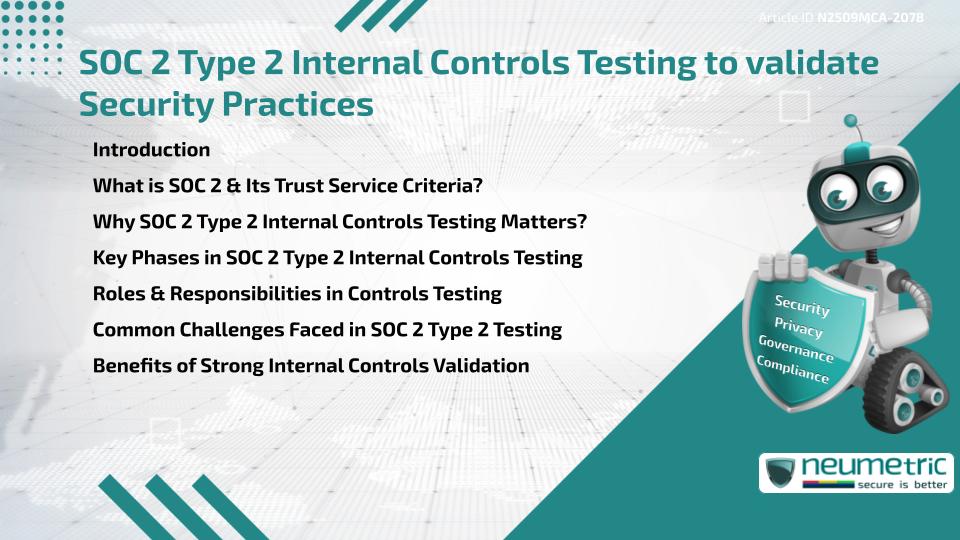Table of Contents
ToggleIntroduction
The SOC 2 Type 2 Internal Controls Testing is a vital component of Compliance for Businesses that manage sensitive Customer Data. Unlike Type 1 Assessments, which only measure design at a single point in time, Type 2 Testing validates whether controls work effectively over an extended period. This ensures that Security Practices are not only documented but actively followed. In this article, we explain the Trust Service Criteria, why this Testing matters, the key phases, roles, challenges & Business benefits.
What is SOC 2 & Its Trust Service Criteria?
SOC 2 refers to Service Organisation Control 2, designed by the American Institute of Certified Public Accountants [AICPA]. The Framework evaluates Internal Controls across five Trust Service Criteria: Security, Availability, Processing Integrity, Confidentiality & Privacy.
Each Criterion serves a different purpose. For example, Security focuses on preventing unauthorised access, while Confidentiality ensures Sensitive Information is properly safeguarded. SOC 2 is particularly important for Service Providers like Cloud Platforms, Software as a Service [SaaS] Companies & Payment Processors.
Why SOC 2 Type 2 Internal Controls Testing Matters?
The SOC 2 Type 2 Internal Controls Testing proves that safeguards are not just designed but consistently applied. This is critical for Business Decision-Makers who must demonstrate accountability to Clients, Regulators & Stakeholders.
Unlike Certifications that can be obtained with minimal observation, SOC 2 Type 2 Audits require months of Evidence. Clients gain assurance that the Company’s systems are monitored, documented & functioning as promised.
Key Phases in SOC 2 Type 2 Internal Controls Testing
The SOC 2 Type 2 Internal Controls Testing usually involves the following phases:
- Scoping & Planning – Define the Systems & Criteria that apply to the Business.
- Readiness Assessment – Identify Control Gaps before the official Audit begins.
- Remediation – Implement necessary updates, such as stronger Password Policies or better Access Monitoring.
- Observation Period – Typically lasting six (6) to twelve (12) months, where Auditors track & evaluate Control performance.
- Audit Report – Auditors issue findings that confirm whether Controls operated effectively throughout the Observation Period.
Roles & Responsibilities in Controls Testing
Successful Testing requires coordinated efforts from multiple roles:
- Executives – Allocate resources & oversee Compliance objectives.
- IT Teams – Maintain technical safeguards such as Encryption, Firewalls & Monitoring Tools.
- Compliance Officers – Ensure accurate documentation & coordinate with Auditors.
- Auditors – Provide independent verification & compile the official SOC 2 Type 2 Report.
When each role aligns with the Testing process, Businesses can reduce delays & strengthen their overall Compliance posture.
Common Challenges Faced in SOC 2 Type 2 Testing
Organisations frequently encounter roadblocks during SOC 2 Type 2 Internal Controls Testing. The most common include:
- Misinterpreting the difference between design validation & operational Testing.
- Struggling to provide consistent documentation during the Observation Period.
- Overestimating the strength of technical tools while neglecting Employee practices.
- Viewing SOC 2 as a one-time project instead of an ongoing requirement.
Overcoming these challenges requires ongoing Monitoring, Training & Management support.
Benefits of Strong Internal Controls Validation
Completing the SOC 2 Type 2 Internal Controls Testing provides benefits beyond Compliance:
- Stronger Client Confidence – Clients trust Companies that prove Security Practices work in real scenarios.
- Competitive Advantage – Certification can differentiate a Business in crowded markets.
- Improved Risk Management – Early detection of Control weaknesses prevents costly Incidents.
- Operational Discipline – Encourages consistent & efficient processes across the Organisation.
These benefits make the Testing process not just a requirement, but a strategic investment in credibility & resilience.
Takeaways
- The SOC 2 Type 2 Internal Controls Testing validates Security Practices over time, not just at a single point.
- The process includes Planning, Readiness, Remediation, Observation & Reporting.
- Collaboration across Executives, IT, Compliance & Auditors ensures success.
- Continuous Monitoring & documentation are critical to maintaining Compliance.
FAQ
What is the main purpose of SOC 2 Type 2 Internal Controls Testing?
Its main purpose is to confirm that Security & Compliance Controls are operating effectively over an extended period.
How long does the Observation Period last in SOC 2 Type 2 Testing?
It typically lasts six (6) to twelve (12) months, depending on Audit scope.
Who requires SOC 2 Type 2 Internal Controls Testing?
Any Business that handles Sensitive Customer Information, such as SaaS Companies, Cloud Service Providers & Financial Institutions.
Does failing the Test mean the Company is non-compliant?
Not necessarily. Failures indicate Gaps that can be remediated before a future Audit.
Is SOC 2 Type 2 Testing mandatory by law?
No, but many Clients demand it as a contractual requirement for Partnerships.
Can Startups handle SOC 2 Type 2 Internal Controls Testing?
Yes, but they must carefully plan resources, as the process can be time & cost intensive.
How often should SOC 2 Type 2 Testing be repeated?
It is typically performed annually to maintain trust & demonstrate continued Compliance.
Need help for Security, Privacy, Governance & VAPT?
Neumetric provides organisations the necessary help to achieve their Cybersecurity, Compliance, Governance, Privacy, Certifications & Pentesting needs.
Organisations & Businesses, specifically those which provide SaaS & AI Solutions in the Fintech, BFSI & other regulated sectors, usually need a Cybersecurity Partner for meeting & maintaining the ongoing Security & Privacy needs & requirements of their Enterprise Clients & Privacy conscious Customers.
SOC 2, ISO 27001, ISO 42001, NIST, HIPAA, HECVAT, EU GDPR are some of the Frameworks that are served by Fusion – a SaaS, multimodular, multitenant, centralised, automated, Cybersecurity & Compliance Management system.
Neumetric also provides Expert Services for technical security which covers VAPT for Web Applications, APIs, iOS & Android Mobile Apps, Security Testing for AWS & other Cloud Environments & Cloud Infrastructure & other similar scopes.
Reach out to us by Email or filling out the Contact Form…


